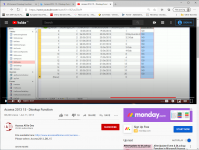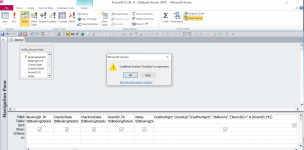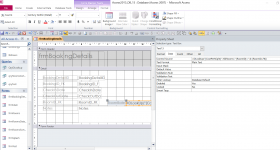Hi There I seem to be unable to do a DLookup in a query.
I have a separate database to the one shown and was experimenting on using DLookup in a query. Unfortunately it failed with a message "Undefined function 'DlookUp' in expression"
This has had me stumped for a few days after checking syntax etc to make sure I was right. Still no luck, so I resorted to looking at an example on youtube with the details as per the attached screen shot. "Dlookup_YouTube_Example"
I downloaded the database and proceeded to construct the query as the instructor was demonstrating same in the video.
I have double checked each part of the Dlookup command but when I go to RUN the query I get the error "Undefined function 'DlookUp' in expression"
See second attachment "DLookUp_Error_Msg"
Interestingly if I build a form based on the "tblbookingDetails" and then add a text field called Room Rate and make the control source =DLookUp("[CostPerNight]","tblRooms","[RoomID]=" & [RoomID_FK]) to find the roomrate it works perfectly. I just cannot seem to get the Dlookup to work on a query.
Does anyone have any suggestions please?
I have a separate database to the one shown and was experimenting on using DLookup in a query. Unfortunately it failed with a message "Undefined function 'DlookUp' in expression"
This has had me stumped for a few days after checking syntax etc to make sure I was right. Still no luck, so I resorted to looking at an example on youtube with the details as per the attached screen shot. "Dlookup_YouTube_Example"
I downloaded the database and proceeded to construct the query as the instructor was demonstrating same in the video.
I have double checked each part of the Dlookup command but when I go to RUN the query I get the error "Undefined function 'DlookUp' in expression"
See second attachment "DLookUp_Error_Msg"
Interestingly if I build a form based on the "tblbookingDetails" and then add a text field called Room Rate and make the control source =DLookUp("[CostPerNight]","tblRooms","[RoomID]=" & [RoomID_FK]) to find the roomrate it works perfectly. I just cannot seem to get the Dlookup to work on a query.
Does anyone have any suggestions please?




